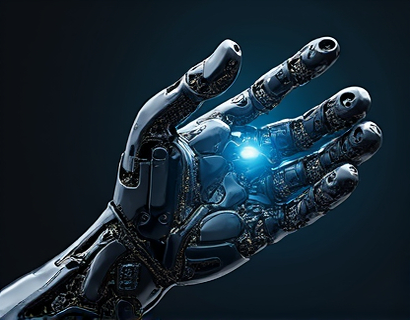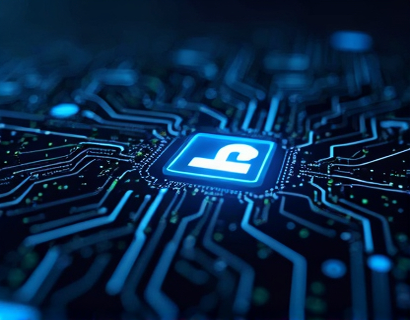Unlocking Digital Transformation: Harnessing Crypto and AI for Next-Gen Ecosystem Growth
The digital landscape is undergoing a profound transformation, driven by the convergence of blockchain technology and artificial intelligence. This synergy is not just a trend but a fundamental shift that promises to revolutionize how applications and services interact, fostering unprecedented growth and engagement. For tech innovators and early adopters, understanding and leveraging this synergy is crucial to staying ahead in the digital age.
Blockchain technology, known for its role in cryptocurrencies, offers a decentralized and secure way to manage transactions and data. When combined with AI, which excels in processing vast amounts of data to provide insights and automate tasks, the potential for innovation becomes immense. This article delves into how these advanced technologies can enhance connectivity, elevate online presence, and provide a roadmap to substantial growth and engagement.
Understanding Blockchain and AI
To fully appreciate the transformative power of blockchain and AI, it's essential to understand each technology individually.
Blockchain is a distributed ledger technology that ensures transparency, security, and immutability. It operates on a network of nodes, each maintaining a copy of the ledger, making it resistant to tampering and fraud. Smart contracts, self-executing contracts with the terms directly written into code, are a key feature of blockchain, enabling automated and trustless transactions.
Artificial Intelligence, on the other hand, encompasses a range of technologies that enable machines to perform tasks that traditionally required human intelligence. These include machine learning, natural language processing, and computer vision. AI's ability to analyze complex data, learn from patterns, and make predictions or decisions autonomously makes it a powerful tool for optimizing processes and enhancing user experiences.
Synergy of Blockchain and AI
The true power of blockchain and AI emerges when they are combined. Blockchain provides a secure and transparent framework, while AI brings intelligence and automation. This synergy can lead to innovative solutions that enhance various aspects of digital ecosystems.
One of the primary benefits is improved data integrity and security. Blockchain's immutable nature ensures that data used by AI algorithms is tamper-proof, reducing the risk of biased or corrupted data. This is particularly crucial in industries like finance, healthcare, and supply chain management, where data accuracy and security are paramount.
Moreover, blockchain can facilitate decentralized AI networks. By distributing AI computations across a network of nodes, these networks can process large datasets more efficiently and securely. This decentralization not only enhances performance but also reduces the risk of single points of failure and censorship.
Enhancing Connectivity and Online Presence
The integration of blockchain and AI can significantly enhance connectivity and online presence. For businesses and individuals, this means more robust and secure digital interactions, leading to increased trust and engagement.
Decentralized applications (dApps) are a prime example of this synergy. Built on blockchain platforms, dApps leverage AI to provide intelligent and adaptive user experiences. These applications can operate without central control, reducing dependency on intermediaries and lowering transaction costs. Users benefit from greater control over their data and more seamless interactions.
Smart contracts automate and enforce agreements, ensuring that all parties adhere to the terms without the need for intermediaries. This not only speeds up processes but also builds trust through transparency. For instance, in the supply chain, smart contracts can track the movement of goods, verify authenticity, and ensure compliance with regulations, all while being transparent to all stakeholders.
Driving Substantial Growth and Engagement
The combination of blockchain and AI can drive substantial growth and engagement by creating more efficient, secure, and user-centric digital ecosystems.
For businesses, this means leveraging AI to gain deep insights into customer behavior and preferences, while using blockchain to ensure data integrity and secure transactions. This dual approach can lead to more personalized and trusted interactions, fostering customer loyalty and driving revenue growth.
In the realm of finance, blockchain and AI can revolutionize services such as lending, trading, and risk management. AI algorithms can analyze vast amounts of financial data to identify trends and predict market movements, while blockchain ensures secure and transparent transactions. This can lead to more accurate and efficient financial services, reducing costs and increasing accessibility.
In the healthcare sector, the synergy can enhance patient care and data management. AI can analyze medical data to provide personalized treatment recommendations, while blockchain ensures the secure and privacy-preserving sharing of medical records. This not only improves patient outcomes but also streamlines healthcare operations.
Roadmap to Digital Transformation
For tech innovators and early adopters looking to harness the power of blockchain and AI, here is a roadmap to drive digital transformation and achieve unprecedented growth and engagement:
1. Assess Current Infrastructure
The first step is to evaluate your existing digital infrastructure. Identify areas where blockchain and AI can add value, such as data security, process automation, and customer engagement. Understanding your current pain points will help in prioritizing initiatives.
2. Build a Skilled Team
Digital transformation requires a team with diverse skills, including blockchain developers, AI specialists, data scientists, and cybersecurity experts. Invest in training and hiring professionals who can navigate the complexities of these technologies.
3. Pilot Projects
Start with small-scale pilot projects to test the integration of blockchain and AI. This approach allows you to experiment, learn, and refine your strategies before scaling up. Focus on use cases that can demonstrate tangible benefits, such as supply chain transparency or customer service automation.
4. Leverage Decentralized Platforms
Consider using decentralized platforms for building dApps and smart contracts. Platforms like Ethereum, Binance Smart Chain, and Polkadot offer robust ecosystems for developing and deploying blockchain-based solutions. These platforms also support AI integrations through various tools and libraries.
5. Ensure Data Privacy and Security
Data privacy and security are critical when dealing with blockchain and AI. Implement best practices such as encryption, access controls, and regular security audits. Compliance with regulations like GDPR and HIPAA is also essential to build trust and avoid legal issues.
6. Foster a Culture of Innovation
Encourage a culture of innovation within your organization. Promote experimentation, learning from failures, and continuous improvement. Stay updated on the latest developments in blockchain and AI by attending conferences, workshops, and online courses.
7. Measure and Optimize
Use key performance indicators (KPIs) to measure the impact of blockchain and AI initiatives. Monitor metrics such as transaction speed, data accuracy, user engagement, and cost savings. Based on the insights gained, optimize your strategies to maximize benefits and address any challenges.
8. Collaborate and Ecosystem Building
Collaboration is key in the digital transformation journey. Partner with other organizations, startups, and research institutions to share knowledge, resources, and best practices. Building a strong ecosystem can accelerate innovation and open up new opportunities.
Additionally, engage with the broader community through open-source projects, forums, and industry groups. Contributing to the ecosystem not only enhances your reputation but also provides valuable feedback and insights.
Conclusion
The convergence of blockchain and AI represents a significant opportunity for tech innovators and early adopters to drive digital transformation. By enhancing connectivity, securing data, and automating processes, these technologies can lead to substantial growth and engagement in the digital age. Following the roadmap outlined above can help organizations navigate this exciting frontier and unlock their full potential.










































